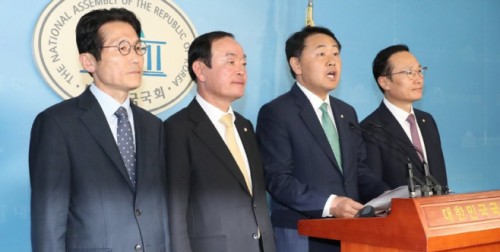 |
| Floor leaders of four parties, excluding the Liberty Korea Party, hold a press conference at the National Assembly on April 22, 2019, after they agreed to fast-track bills on electoral reform and the establishment of an independent investigative agency. (From left) Rep. Youn So-ha of the Justice Party, Rep. Chang Byoung-wan of the Party for Democracy and Peace, Rep. Kim Kwan-young of the Bareunmirae Party, and Rep. Hong Young-pyo of the ruling Democratic Party (DP). / Source: Yonhap News |
By AsiaToday reporter Lim Yoo-jin
The ruling Democratic Party (DP) and three opposition parties agreed Monday to fast-track bills on an electoral reform, the establishment of a unit to investigate high-ranking government officials over corruption, and the adjustment of police’s authority to make investigations independently of the prosecution. The main opposition Liberty Korea Party (LKP) reacted strongly against the move.
Floor leaders of four major parties, including Rep. Hong Young-pyo of the ruling Democratic Party (DP), Rep. Kim Kwan-young of the Bareunmirae Party, Rep. Chang Byoung-wan of the Party for Democracy and Peace and Rep. Youn So-ha of the Justice Party announced that they reached a tentative agreement in a press conference at the National Assembly.
In the case of the electoral reform, the parties decided to make minor adjustments to an agreement reached by four secretaries of the special committee on political reform last month, before putting the electoral bill on the fast track.
Under the agreement, an independent investigative agency, if established, will have the right to investigate high-level government officials’ alleged corruption, request warrants, and apply for adjudication if the prosecution drops a case. If the accused person is a judge, prosecutor or police officer with the rank of superintendent general or higher, the agency will hold the authority to indict in order to check the power of the prosecution. This suggests that an institutional framework would be set up to practically hold the prosecution in check.
For the committee of recommendation, two members of the ruling and the opposition party will be appointed. The head of the corruption investigation unit will be appointed by the president after holding hearings on the nominee. The nominee will be chosen among two nominees recommended with the consent of more than four-fifths of the committee members.
The bill on investigation authority of the prosecution and the police will be put on the fast track based on the agreement reached among the members of the special electoral reform committee.
The parties will hold separate meetings with their lawmakers to ratify the agreement. Then, special parliamentary committees on political and electoral reforms will review the agreement to spur the fast-track designation of the relevant bills. The parties will put the bills to votes at an Assembly session.
The LKP strongly opposed the other parties’ move by saying, “If the electoral reform bill and independent investigative agency are put on the fast track, there will be no 20th Assembly.” The conservative party plans to hold an emergency meeting on Tuesday to prevent the passage of the bills.
“Proceeding with the fast-tracking means they will quit democracy,” LKP floor leader Na Kyoung-won said. “Fast-tracking is not an agreement, but a manipulation of democracy and a rejection of agreement.”
The four parties also reached a tentative deal to handle the revised bill of the Special Act on the May 18 Democratization Movement by May 18. The revised bill on the National Assembly Act will be handled during the 21st National Assembly.
#fast-track #electoral reform #DP #LKP #DP
Copyright by Asiatoday
Most Read
-
1
-
2
-
3
-
4
-
5
-
6
-
7





















